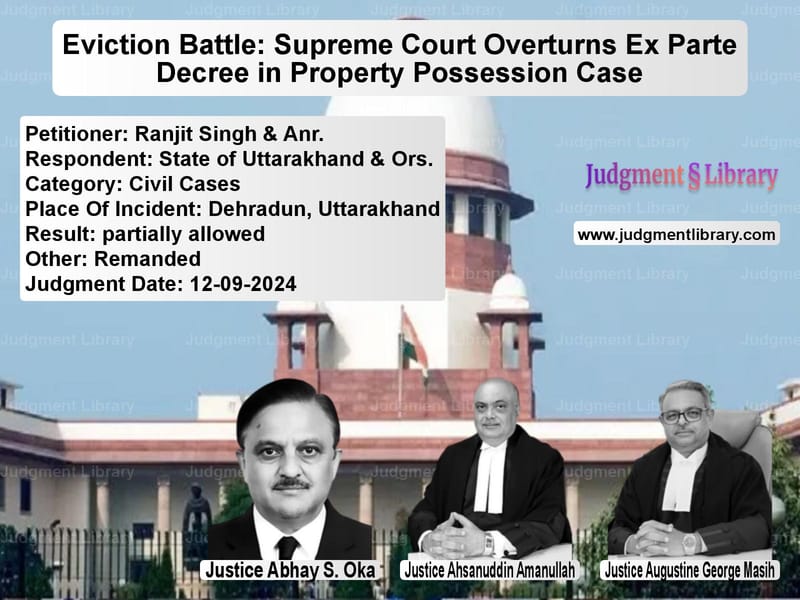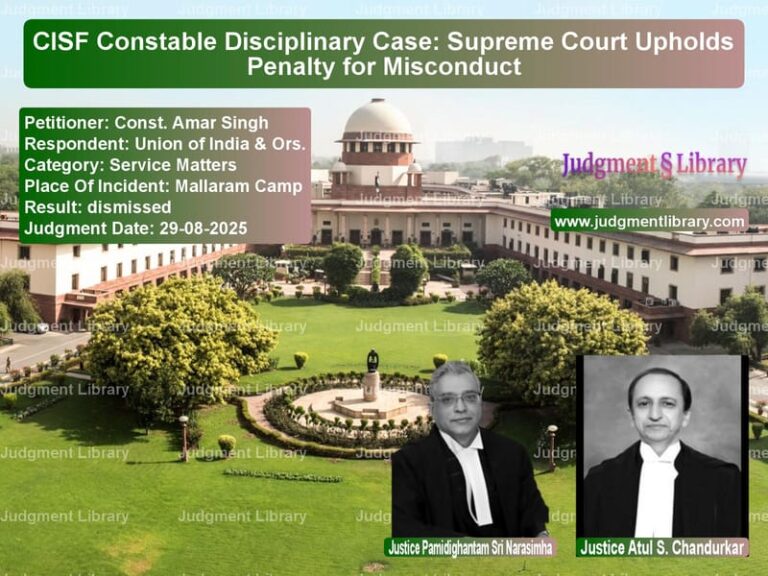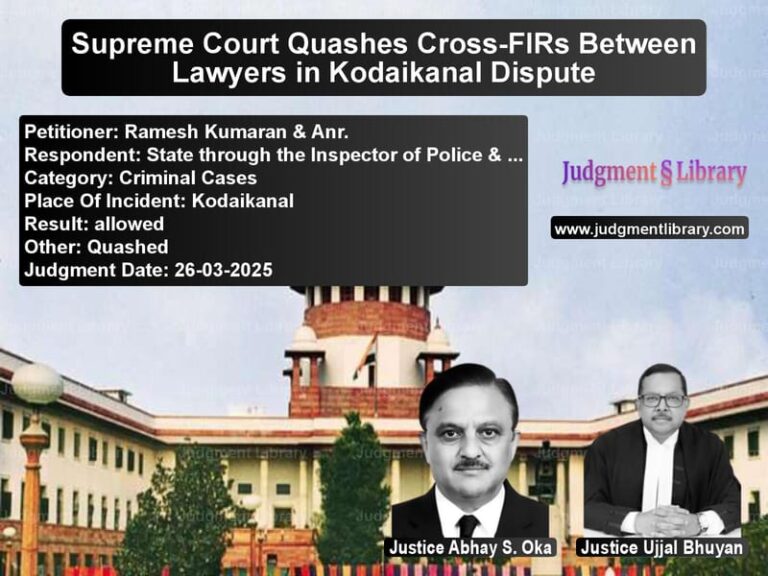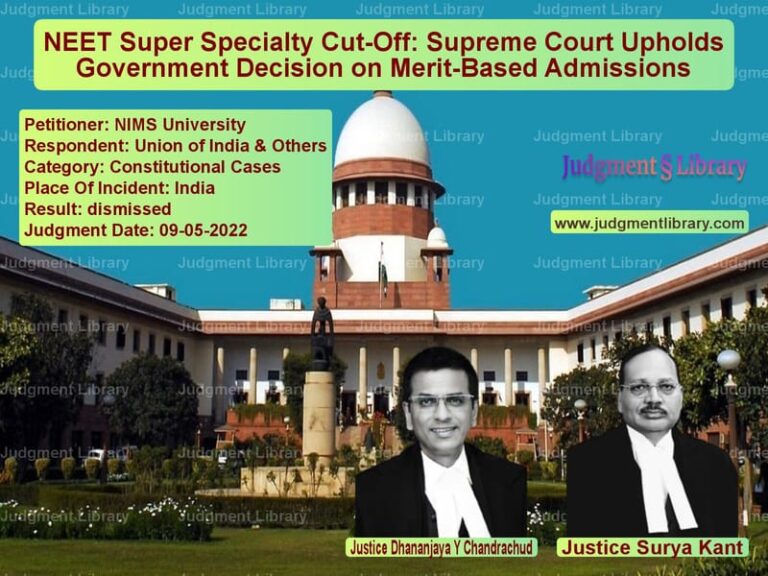Eviction Battle: Supreme Court Overturns Ex Parte Decree in Property Possession Case
The legal battle between Ranjit Singh & Anr. and the State of Uttarakhand & Ors. revolved around a dispute over property possession and rental dues. The Supreme Court, in its detailed judgment, overturned an ex parte decree issued by the trial court due to significant procedural lapses. The decision reinstated the case, ensuring a fair opportunity for both parties to argue their claims.
The dispute originated from a rental agreement where the State of Uttarakhand was a tenant of the plaintiffs for a property at a monthly rent of Rs.86,232. Alleging non-payment of rent since 1993, the plaintiffs initiated eviction proceedings in 2001. The trial court’s handling of the case led to an ex parte decree in favor of the plaintiffs, which the defendants challenged, citing violations of natural justice.
Background of the Case
The lawsuit was filed on November 8, 2001, by the plaintiffs seeking possession of the suit property. They contended that the defendants failed to pay the agreed-upon rent, prompting them to issue a notice terminating the tenancy under Section 106 of the Transfer of Property Act, 1882. When the defendants did not comply, the plaintiffs proceeded with the eviction suit.
Read also: https://judgmentlibrary.com/supreme-court-upholds-land-ownership-in-bangalore-property-dispute/
The trial court initially provided the defendants multiple opportunities to submit a written statement. However, repeated adjournments delayed their response, and on April 22, 2002, the court directed the suit to proceed ex parte. Subsequently, the plaintiffs applied for the defendants’ defense to be struck out, which the court allowed on May 3, 2002, without prior notice to the defendants.
Arguments Presented by the Parties
Petitioners’ Arguments
The plaintiffs, represented by their legal counsel, argued that:
- The defendants had defaulted on their rent obligations since 1993, despite a court order fixing the rent at Rs.86,232 per month in 1999.
- The trial court had rightfully proceeded ex parte due to the defendants’ failure to file a written statement despite multiple opportunities.
- Striking out the defendants’ defense was justified given their inaction and deliberate non-compliance with court orders.
- The eviction order was legally sound and should be upheld to prevent further financial losses to the plaintiffs.
Respondents’ Arguments
The defendants countered the plaintiffs’ claims by emphasizing procedural violations:
- They were denied a fair opportunity to defend themselves as the trial court proceeded ex parte without sufficient cause.
- On April 22, 2002, when the suit was directed to proceed ex parte, the District Judge was conducting a camp court in Mussoorie, making it unclear who had passed the order.
- The striking out of their defense on May 3, 2002, was done without notice, violating natural justice principles.
- The amended plaint, modifying the property description, was not served on them, further undermining their right to a fair defense.
Supreme Court’s Observations and Ruling
The Supreme Court scrutinized the procedural aspects of the case and found substantial irregularities:
- The order to proceed ex parte was issued on April 22, 2002, while the next scheduled hearing was May 30, 2002. The defendants could have utilized this period to seek relief.
- On May 3, 2002, the plaintiffs moved for the defendants’ defense to be struck out. The court granted this application on the same day without notifying the defendants, violating their right to be heard.
- The defendants retained a limited right to cross-examine the plaintiffs’ witnesses, which was improperly denied.
- Even if a defendant does not file a written statement, courts must ensure they receive notices of critical proceedings, which was not done in this case.
Recognizing these flaws, the Supreme Court set aside the ex parte decree and reinstated the suit with conditions. It mandated the defendants to deposit Rs.1,00,000 per month from July 14, 2014, to continue litigation.
Key Directives from the Supreme Court
The Court laid down specific instructions:
- The ex parte decree dated August 24, 2002, was nullified.
- The case was restored before the District and Sessions Judge, Dehradun.
- The defendants were required to deposit an ad hoc amount of Rs.1,00,000 per month from July 14, 2014, subject to adjustments.
- The defendants must appear before the trial court on November 25, 2024, without needing additional notices.
- If the defendants fail to file a reply to the application for striking out their defense on that date, the trial court may proceed without their response.
- Funds deposited in the Supreme Court were to be transferred to the trial court.
- The trial court was directed to expedite proceedings given the long pendency of the case.
Implications of the Judgment
This ruling underscores the importance of procedural fairness in legal proceedings. The Supreme Court reaffirmed that procedural lapses should not prejudice a party’s right to a fair trial. By ensuring the defendants receive a fair opportunity to present their case, the ruling upholds the principles of natural justice.
The judgment serves as a crucial precedent for property disputes, highlighting the necessity of due process and proper notice in eviction cases. It reinforces that while courts must enforce discipline in litigation, procedural shortcuts cannot override fundamental rights.
Petitioner Name: Ranjit Singh & Anr..Respondent Name: State of Uttarakhand & Ors..Judgment By: Justice Abhay S. Oka, Justice Ahsanuddin Amanullah, Justice Augustine George Masih.Place Of Incident: Dehradun, Uttarakhand.Judgment Date: 12-09-2024.
Don’t miss out on the full details! Download the complete judgment in PDF format below and gain valuable insights instantly!
Download Judgment: ranjit-singh-&-anr.-vs-state-of-uttarakhand-supreme-court-of-india-judgment-dated-12-09-2024.pdf
Directly Download Judgment: Directly download this Judgment
See all petitions in Property Disputes
See all petitions in Contract Disputes
See all petitions in Damages and Compensation
See all petitions in Judgment by Abhay S. Oka
See all petitions in Judgment by Ahsanuddin Amanullah
See all petitions in Judgment by Augustine George Masih
See all petitions in partially allowed
See all petitions in Remanded
See all petitions in supreme court of India judgments September 2024
See all petitions in 2024 judgments
See all posts in Civil Cases Category
See all allowed petitions in Civil Cases Category
See all Dismissed petitions in Civil Cases Category
See all partially allowed petitions in Civil Cases Category







